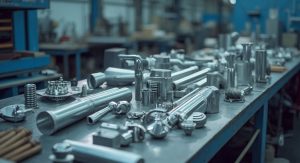
Construction is a fast-paced industry where efficiency and speed are crucial. The efficiency of operations, particularly with regard to the availability and dependability of equipment, frequently determines the success of a project, whether it be a major infrastructural undertaking or a modest residential construction. That’s where a professional construction equipment supplier becomes a key player in the background, ensuring that tools, machinery, and technology arrive on-site, on time, and in optimal working condition.
A construction equipment supplier does much more than simply deliver machinery. They act as logistical partners, technical advisors, and service providers who help contractors stay on schedule and within budget. Their influence on project efficiency is undeniable, and selecting the right supplier can significantly shape a project’s timeline and bottom line.
Ensuring Equipment Availability And Timely Delivery
One of the most direct ways a construction equipment supplier contributes to project efficiency is by ensuring that the necessary tools and machinery are available when needed. Delays in equipment arrival can stall entire operations, throwing off timelines and frustrating clients. A reliable supplier maintains a well-organized inventory and a streamlined delivery system, often allowing clients to schedule deliveries based on real-time site requirements.
For many construction managers, time lost waiting for a critical piece of machinery can translate into thousands of dollars. A dependable supplier eliminates this risk by having systems in place to prevent stock shortages, delivery delays, and last-minute disruptions. Their role becomes one of anticipation and preparation, working in tandem with site managers to predict what equipment will be needed and when.
Offering A Wide Range Of Equipment Options
Project efficiency isn’t just about having access to equipment—it’s about having access to the right equipment. Construction projects vary widely in scope, and so do their machinery needs. Whether it’s excavators for earthmoving, cranes for high-rise construction, or compact loaders for urban builds, a versatile supplier who stocks a wide range of machinery can support multiple phases of a project.
Moreover, leading equipment suppliers often offer both rental and purchase options, giving contractors the flexibility to choose what best fits the project’s timeline and budget. This flexibility enables decision-makers to scale up or down quickly without the constraints of ownership, storage, or long-term financial commitment.
Supporting On-Site Productivity Through Maintenance And Repairs
Even the most reliable equipment can face technical issues, especially in demanding job-site conditions. This is where the role of the construction equipment supplier becomes even more critical. The best suppliers don’t just provide machinery—they offer ongoing maintenance, repairs, and technical support.
Prompt service reduces the risk of costly downtime. When machines break down, a responsive supplier can deploy technicians to the site or provide replacement units quickly. Some suppliers even offer remote diagnostic tools and preventive maintenance programs that identify wear and tear before it leads to a failure. By minimizing unplanned outages, they directly contribute to uninterrupted work schedules and higher overall productivity.
Providing Expert Guidance And Compliance Support
Modern construction equipment is complex. Operating heavy machinery often requires trained personnel, and meeting safety or regulatory standards is essential. Reputable suppliers assist clients in choosing the appropriate models based on the project’s needs and ensure that all equipment meets local and national compliance standards.
Some suppliers go the extra mile by offering training resources for operators or helping project managers understand the best practices for fuel efficiency, equipment rotation, or environmental sustainability. Their expertise helps teams make smarter decisions, not only boosting productivity but also avoiding costly mistakes and safety risks.
Enhancing Project Planning And Cost Management
A good construction equipment supplier doesn’t just supply tools—they help build timelines and budgets. Because they understand equipment lead times, maintenance schedules, and logistics, suppliers can become strategic planning partners. This kind of partnership allows construction firms to plan their machinery needs in phases, reducing idle equipment on-site and optimizing resource allocation.
Additionally, many suppliers provide digital solutions like equipment tracking, automated invoicing, and usage reports, allowing project managers to stay organized and control costs more effectively. These insights empower construction companies to better allocate resources, prevent unnecessary rentals or purchases, and make data-driven decisions that improve long-term efficiency.
Final Thoughts
While they may not always be visible in the spotlight, construction equipment suppliers play a foundational role in the rhythm and success of any construction project. They are the silent force behind timely deliveries, functioning machinery, on-site productivity, and logistical clarity. From reducing downtime to offering expert support and enabling flexible equipment access, their impact on project efficiency is profound.








